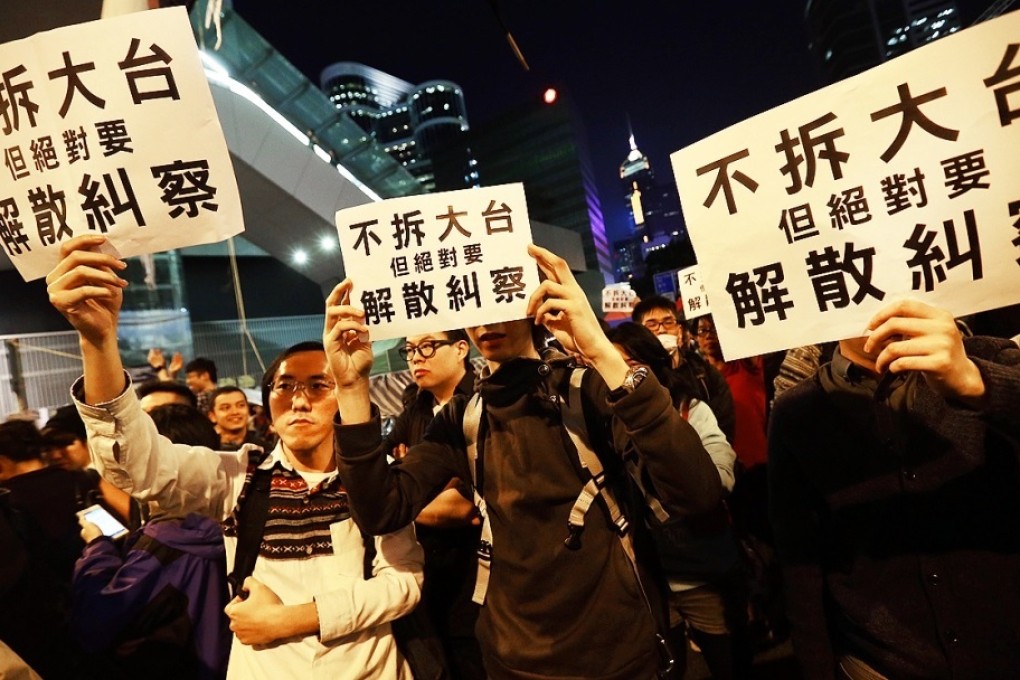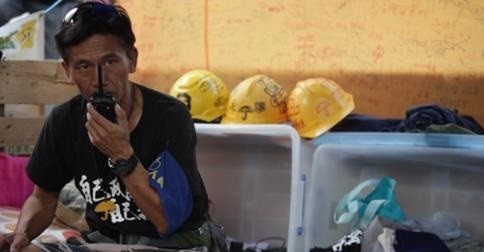As I see it | Million dollar question: What’s next for the Umbrella Movement?

A week ago, a small army of masked men gathered outside the Legco Building at Admiralty in the dead of night. They were upset, so they claimed, over a copyright amendment bill that would limit the freedom of expression on the Internet. The angry men smashed a pair of glass doors at the north entrance and urged student protesters nearby to occupy the legislature. But the students didn’t heed their call. Instead, Occupy Central marshals were dispatched to block the break-in. Minutes later, police moved in with pepper spray and batons, and the men quickly fled the scene.
What appeared to be a clumsy “wreck-and-run” operation by a few agitators has ignited a political firestorm for the Umbrella Movement. Since last week’s incident, self-proclaimed “netizens” have been showing up at Admiralty in droves, challenging the student leadership and demanding that the marshal team be disbanded. Siding with the masked men, they argue that Alex Chow (周永康), Joshua Wong (黃之鋒) and their likes have gotten too comfortable sleeping in their tents, and that they and the self-appointed marshals are now standing in the way of the movement. Not since the Lung Wo Road confrontation with police a month ago have tensions at Admiralty been this high.
No one knows who the masked men and their supporters are – whether they are concerned citizens or members of nativist group Civic Passion (熱血公民) wanting their 15 minutes of fame. What we do know, however, is that there is now a protest within a protest, and a revolution within a revolution that is threatening to tear the movement apart. The emergence of a splinter group has laid bare a critical question facing the leadership: Should they raise the stakes instead of indefinitely prolonging the street occupation without a clear goal?
Indeed, the Umbrella Movement seems to have hit a plateau – or is stuck in a rut, depending on your personal views. Protesters have been camping out on the city’s major arteries for two months. Even though stories of students doing homework at makeshift libraries, recycling water bottles into handicrafts, and generating electricity on exercise bikes are all very nice, critics fear the campaign is veering off track. At some point, denizens of Umbrellaville need to wake up to the reality that occupying city streets is a means rather than an end, and that the ultimate goal is universal suffrage and not some eco-friendly utopian lifestyle. As much as some of us would like the movement to go on forever, it has to end someday, somehow.

I take no issues with Option A. In the past, I have argued that the success of Occupy Central as a post-modern political movement is measured not by tangible results but by the social awakening it brings about. On that account, the students have already achieved a great deal by arousing the youths’ interest in local politics. Packing it in at this point should not be viewed as a failure, but a chance to regroup and re-strategize. Considering how politically sensitized the city has become, Hong Kongers will be ready to re-deploy on a moment’s notice for the next chapter in our fight for democracy. These views notwithstanding, many protesters find the first option anticlimactic and even defeatist. They believe that going home now will kill both their momentum and the dwindling leverage they have over Beijing.
